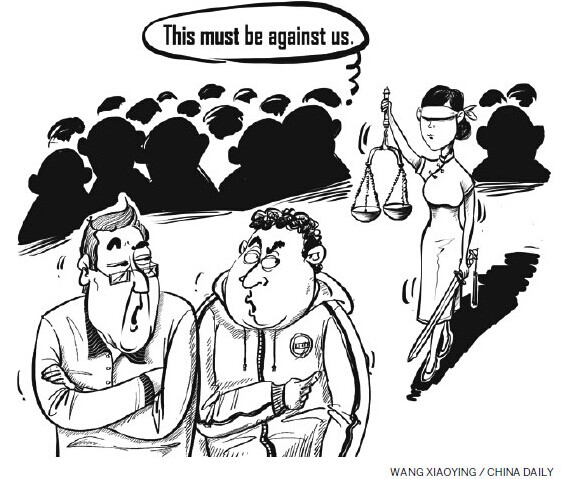

In a recent letter to Vice-Premier Wang Yang, US Treasury Secretary Jacob Lew has expressed concern over China's anti-monopoly investigations, warning that such practices could undermine foreign intellectual property rights and have a serious impact on Sino-US relations. Some Western observers, too, have labeled China's anti-trust probes as being anti-foreign in nature.
The fight against monopoly constitutes a basic component of market economy. Foreign observers and politicians feel that the anti-trust probes are unfairly targeted at foreign companies because, by virtue of operating in China for years, such companies have been capitalizing on the lack of sound rules and institutions to regulate the market and indulging in monopolistic activities.
The "super-national treatment" - such as tax exemptions and/or holidays and other preferential policies - the central government offered to foreign ventures helped many of them to turn into monopolies. Before the government announced a unified rate of income tax for domestic and foreign enterprises on Jan 1, 2008, the rate of income tax for domestic enterprises was 8 percentage points higher than that imposed on foreign companies. Also, some local governments misused the tax exemption policy by offering preferential use of land, water, power and other factors of production to attract foreign companies.
There is nothing wrong with the government - central and local - offering some favorable policies and rules to attract foreign investors in order to boost economic development and introduce more advanced technologies and management expertise to the country. But beyond a certain point, such a practice contravenes the principle of "fair competition". In fact, "excessive use" of such policies by some local governments has widened the competition gap between foreign and domestic companies, with many foreign companies using their superiority over domestic enterprises in terms of funds, technology, management and brands to establish monopolies in the Chinese market.
Besides, taking advantage of their capability to manipulate the market, foreign companies have also abused their monopolistic status. Indeed, China has enacted and implemented a string of market laws and regulations since 1996, but they have a lot of loopholes because of the country's complicated economic and legal situations.
Many foreign companies have used these loopholes to evade China's market laws and indulge in illegal activities such as price fixing, limiting of resale prices and misusing IPR protection, which would have drawn severe penalties even in US and European markets. For example, to bypass China's regulation that forbids the entry of foreign investors into specific industries, some foreign companies and individuals have registered listed entities overseas to control domestic operators that can access these sectors. Of course, a company is branded a monopoly not because of its size or share of the market, but because of the way it uses its position in the market.
Some Western observers have also questioned the fairness of the anti-monopoly probes because no open hearings have been held or clarifications sought from the investigated foreign companies. They have also alleged that the investigated foreign enterprises are barred from hiring lawyers to fight their case or coerced into accepting penalties. If that were indeed the case, why so many foreign companies have been declared free of monopolistic traits after being probed by anti-trust agencies?
It is true that a number of foreign companies have been penalized for monopolistic activities since January 2013, but they account for only 10 percent of all those investigated since China implemented the Anti-Monopoly Law in 2008. The purpose of Chinese authorities is not to target companies based on their ownerships and parent countries, but to regulate the business environment.
The anti-trust probes are aimed at helping China promote mature market operations, abandon preferential policies for foreign companies and allow the market to play a more decisive role in resource distribution by setting up a truly efficient regulatory and sound legal system.
The author Liu Hui is an assistance research fellow with the Institute of American Studies, Chinese Academy of Social Sciences.
Critics misunderstand nature of antitrust campaign
2014-09-1911 Japanese firms fined for antitrust violation
2014-09-18ABB supports nation‘s antitrust drive, top executive says
2014-09-18FAW-VW antitrust probe sparked by customer complaint
2014-09-12Antitrust probes not targeted at foreign firms: regulators
2014-09-12‘Antitrust probes aim to ensure market transparency and rights of consumers‘
2014-09-02Antitrust probes open and fair
2014-08-27Copyright ©1999-2018
Chinanews.com. All rights reserved.
Reproduction in whole or in part without permission is prohibited.